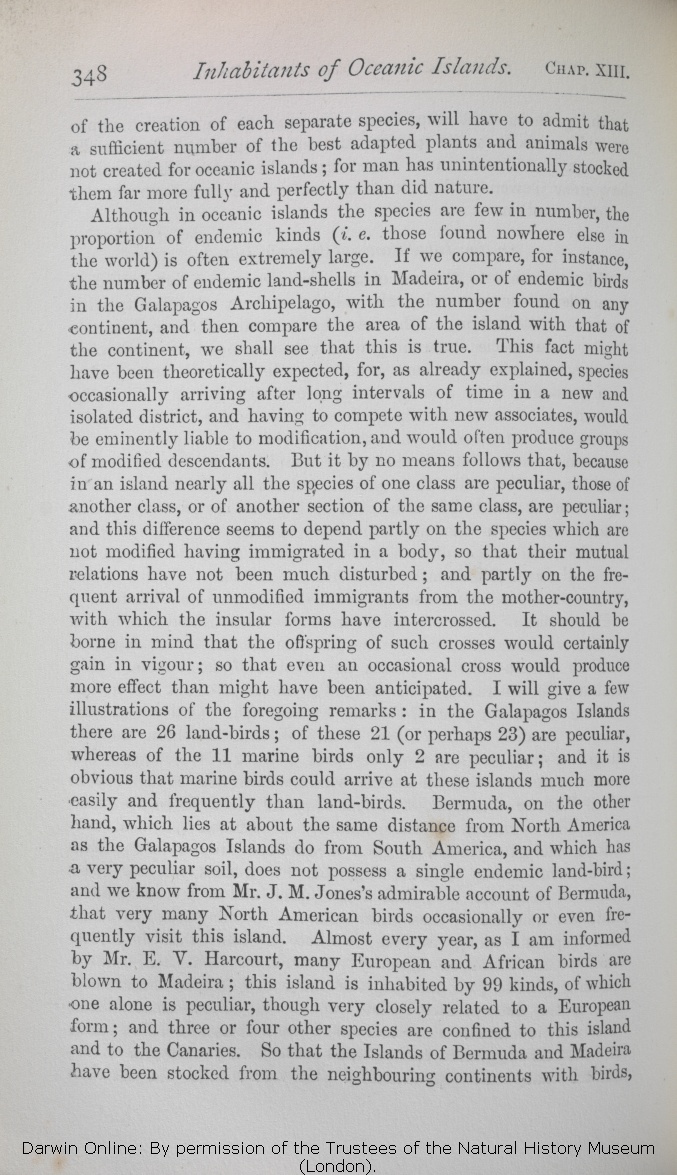Although in oceanic islands the
species are few in number, | species are few in number, 1869 1872 |
| number of kinds of inhabitants is scanty, 1859 1860 1861 |
| number of the inhabitants is scanty 1866 |
| the 1859 1860 1861 1869 1872 |
| in kind, the 1866 |
| kinds 1869 1872 | | species 1859 1860 1861 1866 |
|
(
i.e.
1861 1866 1872 |
|
(
i
.
e
.
1859 |
|
(
I. e.
1860 1869 |
| ..... 1869 1872 | | the 1859 1860 1861 1866 |
| ..... 1869 1872 | | the 1859 1860 1861 1866 |
| island 1869 1872 | | islands 1859 1860 1861 1866 |
| theoretically expected, 1869 1872 |
| expected on my theory, 1859 1860 1861 1866 |
| of time in 1866 1869 1872 |
| in 1859 1860 1861 |
| would 1869 1872 | | will 1859 1860 1861 1866 |
| would 1869 1872 | | will 1859 1860 1861 1866 |
| follows 1861 1866 1869 1872 | | follows, 1859 1860 |
| partly on 1860 1861 1866 1869 1872 | | on 1859 |
| are 1869 1872 | | do 1859 1860 1861 1866 |
| ..... 1869 1872 | | become 1859 1860 1861 1866 |
| OMIT 1869 1872 |
| with facility and 1859 1860 1861 1866 |
| disturbed; and partly on the frequent arrival of unmodified immigrants from the mother-country, with which the insular forms have intercrossed. 1869 1872 |
| disturbed. 1859 |
| disturbed; and partly on the frequent arrival of unmodified immigrants from the mother-country, and the consequent intercrossing with them. 1860 1861 |
| disturbed; and partly on the frequent arrival of un- modified immigrants from the mother-country, and the consequent intercrossing with them. 1866 |
| It 1869 1872 |
| With respect to the effects of this intercrossing, it 1860 1861 1866 |
| borne in mind 1869 1872 |
| remembered 1860 1861 1866 |
| ..... 1872 | | almost 1860 1861 1866 1869 |
| ..... 1869 1872 | | at first 1860 1861 1866 |
| have been 1860 1869 1872 | | be 1861 1866 |
| I will 1869 1872 | | To 1860 1861 1866 |
| illustrations of the foregoing remarks: 1869 1872 |
| examples: 1860 1861 1866 |
| there are 26 land-birds; of these 21 (or perhaps 23) 1866 1869 1872 |
| nearly every land-bird, but only two out of the eleven marine birds, 1860 |
| there are 26 land-birds; of these, 21 (or perhaps 23) 1861 |
| peculiar, 1861 1866 1869 1872 | | peculiar; 1860 |
| whereas of the 11 1861 1866 1869 1872 |
| and it is obvious that 1860 |
| only 2 are peculiar; and it is obvious that marine birds could 1861 1869 1872 |
| could 1860 |
| only 2 are peculiar; and it is obvious that marine birds only 2 are peculiar; and it is obvious that marine birds could 1866 |
| much more easily and frequently 1869 1872 |
| more easily 1860 1861 1866 |
| 1 blocks not present in 1860 1861 1866 1869 1872; present in 1859 | | Thus in the Galapagos Islands nearly every land-bird, but only two out of the eleven marine birds, are peculiar; and it is obvious that marine birds could arrive at these islands more easily than land-birds.
|
| a single endemic land-bird; 1869 1872 |
| one endemic land bird; 1859 |
| one endemic land-bird; 1860 1861 1866 |
| Jones's 1859 1860 1861 1866 1872 | | Joness 1869 |
| birds 1866 1869 1872 | | birds, 1859 1860 1861 |
| occasionally or even frequently visit 1869 1872 |
| during their great annual migrations, visit either periodically or occasionally 1859 1860 1861 |
| occasionally visit 1866 |
| the 1869 1872 | | these two 1859 1860 1861 | | the two 1866 |
| Islands 1872 | | islands 1859 1860 1861 1866 1869 |
| from the neighbouring continents with 1869 1872 |
| by 1859 1860 1861 1866 |
|









